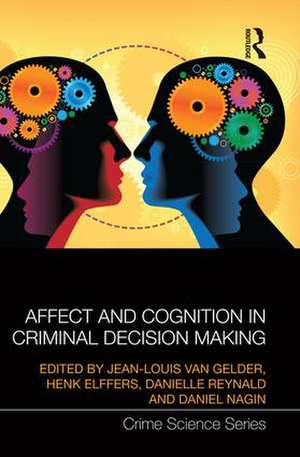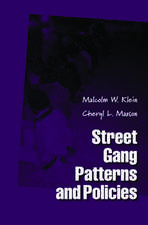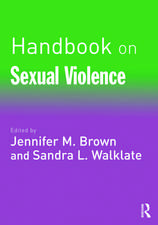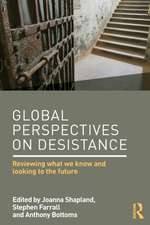Affect and Cognition in Criminal Decision Making: Crime Science Series
Editat de Jean-Louis van Gelder, Henk Elffers, Danielle Reynald, Daniel Naginen Limba Engleză Paperback – 18 iul 2015
This book examines alternative approaches to incorporating affect into criminal decision making and testing its influence on such decisions. In so doing it generalizes extant cognitive theories of criminal decision making by incorporating affect into the decision process. In two conceptual and ten empirical chapters it is carefully argued how affect influences criminal decisions alongside rational and cognitive considerations. The empirical studies use a wide variety of methods ranging from interviews and observations to experimental approaches and questionnaires, and treat crimes as diverse as street robbery, pilfering, and sex offences. It will be of interest to criminologists, social psychologists, judgment and decision making researchers, behavioral economists and sociologists alike.
| Toate formatele și edițiile | Preț | Express |
|---|---|---|
| Paperback (1) | 385.82 lei 3-5 săpt. | +19.16 lei 5-11 zile |
| Taylor & Francis – 18 iul 2015 | 385.82 lei 3-5 săpt. | +19.16 lei 5-11 zile |
| Hardback (1) | 1057.13 lei 6-8 săpt. | |
| Taylor & Francis – 13 noi 2013 | 1057.13 lei 6-8 săpt. |
Din seria Crime Science Series
-
 Preț: 304.19 lei
Preț: 304.19 lei -
 Preț: 295.64 lei
Preț: 295.64 lei -
 Preț: 318.35 lei
Preț: 318.35 lei -
 Preț: 280.51 lei
Preț: 280.51 lei -
 Preț: 304.52 lei
Preț: 304.52 lei -
 Preț: 365.16 lei
Preț: 365.16 lei -
 Preț: 343.33 lei
Preț: 343.33 lei - 31%
 Preț: 765.77 lei
Preț: 765.77 lei -
 Preț: 347.80 lei
Preț: 347.80 lei -
 Preț: 433.30 lei
Preț: 433.30 lei -
 Preț: 369.39 lei
Preț: 369.39 lei -
 Preț: 411.64 lei
Preț: 411.64 lei -
 Preț: 409.31 lei
Preț: 409.31 lei -
 Preț: 447.51 lei
Preț: 447.51 lei -
 Preț: 392.67 lei
Preț: 392.67 lei - 14%
 Preț: 299.03 lei
Preț: 299.03 lei -
 Preț: 444.23 lei
Preț: 444.23 lei -
 Preț: 427.50 lei
Preț: 427.50 lei - 16%
 Preț: 274.06 lei
Preț: 274.06 lei - 8%
 Preț: 419.11 lei
Preț: 419.11 lei -
 Preț: 416.22 lei
Preț: 416.22 lei -
 Preț: 384.97 lei
Preț: 384.97 lei - 20%
 Preț: 408.93 lei
Preț: 408.93 lei
Preț: 385.82 lei
Nou
Puncte Express: 579
Preț estimativ în valută:
73.85€ • 80.24$ • 62.07£
73.85€ • 80.24$ • 62.07£
Carte disponibilă
Livrare economică 31 martie-14 aprilie
Livrare express 15-21 martie pentru 29.15 lei
Preluare comenzi: 021 569.72.76
Specificații
ISBN-13: 9781138933644
ISBN-10: 1138933643
Pagini: 269
Ilustrații: 23 black & white illustrations, 31 black & white tables, 23 black & white line drawings
Dimensiuni: 156 x 234 x 15 mm
Greutate: 0.36 kg
Ediția:1
Editura: Taylor & Francis
Colecția Routledge
Seria Crime Science Series
Locul publicării:Oxford, United Kingdom
ISBN-10: 1138933643
Pagini: 269
Ilustrații: 23 black & white illustrations, 31 black & white tables, 23 black & white line drawings
Dimensiuni: 156 x 234 x 15 mm
Greutate: 0.36 kg
Ediția:1
Editura: Taylor & Francis
Colecția Routledge
Seria Crime Science Series
Locul publicării:Oxford, United Kingdom
Public țintă
Postgraduate and UndergraduateCuprins
1. Introduction Affect and Cognition in Criminal Decision Making: Between Rational Choices and Lapses of Self-Control, 2. Affect and the Reasoning Criminal: Past and Future, 3. Affect and the Dynamic Foreground of Predatory Street Crime: Desperation, Anger, and Fear, 4. Posterior Gains and Immediate Pains: Offender Emotions Before, During and After Robberies, 5. The Role of Sexual Arousal and Perceived Consequences in Men’s and Women’s Decisions to Engage in Sexually Coercive Behaviors, 6. Sexual Arousal and the Ability to Access Sexually Aggressive Consequences from Memory, 7. Emotional Arousal and Child Sex Offending: A Situational Perspective, 8. "I Would Have Been Sorry": Anticipated Regret and the Role of Expected Emotions in the Decision to Offend, 9. Anticipated Emotions and Immediate Affect in Criminal Decision Making: From Shame to Anger, 10. Emotional Justifications for Unethical Behavior, 11. A Neuropsychological Test of Criminal Decision Making: Regional Prefrontal Influences in a Dual Process Model, 12. Traits and States of Self-Conscious Emotions in Criminal Decision Making.
Notă biografică
Jean-Louis van Gelder currently works as a researcher at the Netherlands Institute for the Study of Crime and Law Enforcement (NSCR). His research interests focus on criminal decision making where he applies insights from social psychology and social cognition to study the interplay of affect and cognition on criminal decisions. Recently, he started researching multiple self models and future self continuity, to apply them to criminal behavior. Other research interests include personality and crime and informality in developing countries.
Henk Elffers is a senior-researcher at NSCR and professor of empirical research into criminal law enforcement at VU University Amsterdam. He has worked in the field of rule compliance, spataila criminology, rational choice, guardianship, punishment.
Daniel Nagin holds a PhD in Urban and Public Affairs from Carnegie Mellon University, where he is now the Teresa and H. John Heinz III University Professor of Public Policy and Statistics, and a specialist on deterrence theory. He has amply published on various aspects of the rational choice paradigm in criminology.
Danielle Reynald trained as a social-psychologist (London) and did a Ph.D in criminology (Amsterdam). She is a lecturer in Criminology at Griffith University, where she teaches spatial and environmental criminology. Her specialism is guardianship research.
Henk Elffers is a senior-researcher at NSCR and professor of empirical research into criminal law enforcement at VU University Amsterdam. He has worked in the field of rule compliance, spataila criminology, rational choice, guardianship, punishment.
Daniel Nagin holds a PhD in Urban and Public Affairs from Carnegie Mellon University, where he is now the Teresa and H. John Heinz III University Professor of Public Policy and Statistics, and a specialist on deterrence theory. He has amply published on various aspects of the rational choice paradigm in criminology.
Danielle Reynald trained as a social-psychologist (London) and did a Ph.D in criminology (Amsterdam). She is a lecturer in Criminology at Griffith University, where she teaches spatial and environmental criminology. Her specialism is guardianship research.
Recenzii
"Personally, the editors (and contributors) convinced me of the critical importance of this field in criminology."
Benoit Leclerc, PhD, Senior Lecturer, School of Criminology and Criminal Justice, Griffith University
This collection of papers is a timely and important contribution to our understanding of criminal decision making. It extends the utility of rational choice theory, and enhances its potential for further practical application.
Professor Max Taylor, University of St Andrews
Some while ago I called for researchers in situational crime prevention to ‘make offenders richer’, in the sense of adding emotional and motivational depth to the two-dimensional Rational Choice model, valuable though that has been and will continue to be. Understanding the whole person of the offender – by incorporating affect – can both sharpen and widen our options in designing situational interventions, and suggest new interventions that we have not yet envisaged. The authors of this book have enriched the offender indeed, and in so doing have enriched crime science and criminology in a seminal collection of papers that will stimulate research, theory and practice for years to come.
Paul Ekblom, Professor of Design Against Crime, University of the Arts London
This book makes a unique contribution to the offender decision making literature. Examined in the chapters are the implications of recent developments in emotion research for our understanding of how offenders make decisions. These insights will enhance our knowledge of offending and crime prevention.
Professor Anna Stewart, Griffith University, Australia
Benoit Leclerc, PhD, Senior Lecturer, School of Criminology and Criminal Justice, Griffith University
This collection of papers is a timely and important contribution to our understanding of criminal decision making. It extends the utility of rational choice theory, and enhances its potential for further practical application.
Professor Max Taylor, University of St Andrews
Some while ago I called for researchers in situational crime prevention to ‘make offenders richer’, in the sense of adding emotional and motivational depth to the two-dimensional Rational Choice model, valuable though that has been and will continue to be. Understanding the whole person of the offender – by incorporating affect – can both sharpen and widen our options in designing situational interventions, and suggest new interventions that we have not yet envisaged. The authors of this book have enriched the offender indeed, and in so doing have enriched crime science and criminology in a seminal collection of papers that will stimulate research, theory and practice for years to come.
Paul Ekblom, Professor of Design Against Crime, University of the Arts London
This book makes a unique contribution to the offender decision making literature. Examined in the chapters are the implications of recent developments in emotion research for our understanding of how offenders make decisions. These insights will enhance our knowledge of offending and crime prevention.
Professor Anna Stewart, Griffith University, Australia
Descriere
This book examines alternative approaches to incorporating affect into criminal decision making and testing its influence on such decisions. In so doing it generalizes extant cognitive theories of criminal decision making by incorporating affect into the decision process. In two conceptual and ten empirical chapters it is carefully argued how affect influences criminal decisions alongside rational and cognitive considerations. The empirical studies use a wide variety of methods ranging from interviews and observations to experimental approaches and questionnaires, and treat crimes as diverse as street robbery, pilfering, and sex offences. It will be of interest to criminologists, social psychologists, judgment and decision making researchers, behavioral economists and sociologists alike.


















